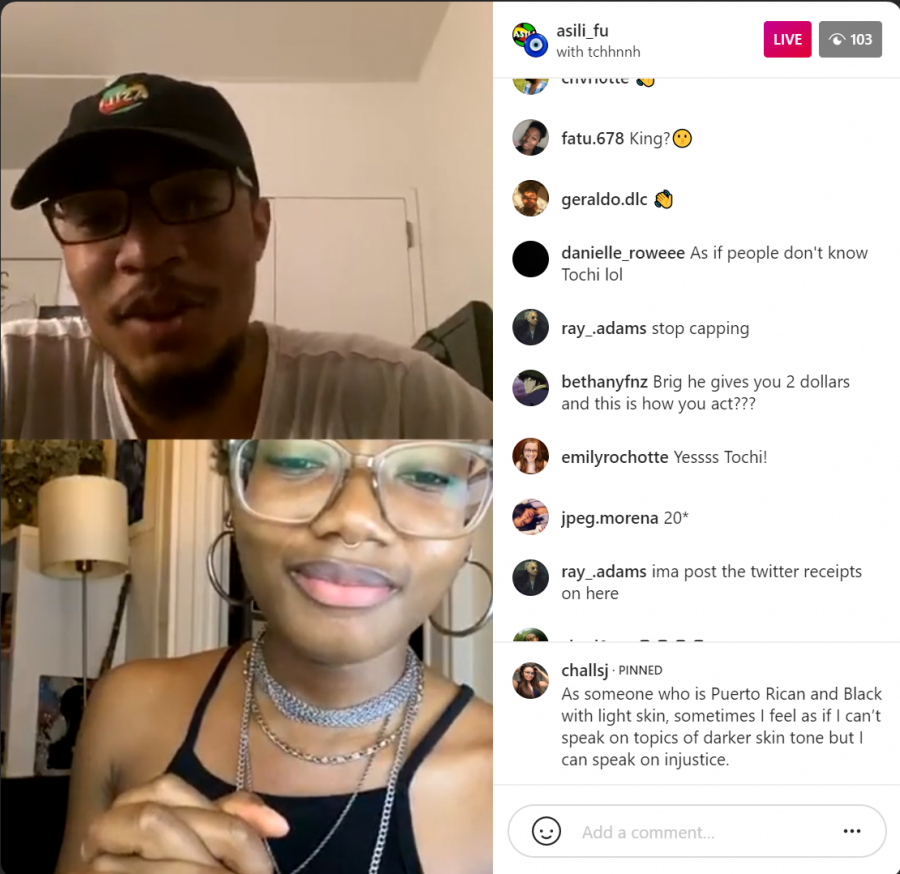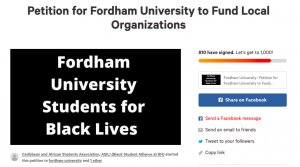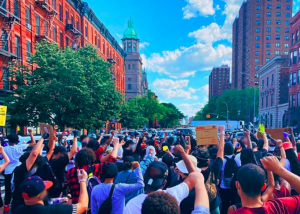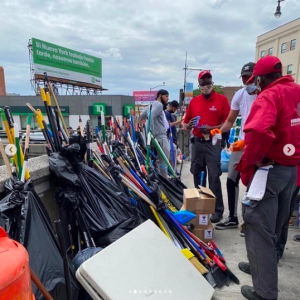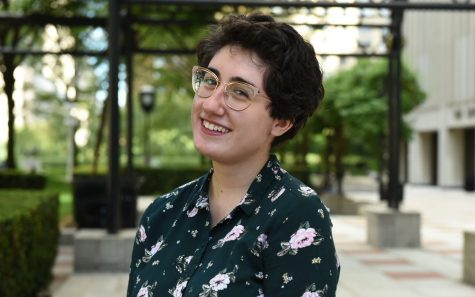ASILI Holds Town Hall on Racial Issues at Fordham
INSTAGRAM LIVE
ASILI members and alumni shared their concerns and experiences of being students of color on campus.
June 5, 2020
On June 3, ASILI, the Black Student Alliance (BSA) at Fordham’s Rose Hill campus, hosted a town hall via Instagram Live. Over 100 viewers tuned into the more than two-hour discussion moderated by ASILI President Diontay Santiago, Gabelli School of Business at Rose Hill (GSBRH) ’21.
ASILI E-Board members and guests took the floor one by one to answer viewers’ questions regarding the Black Lives Matter movement. Members also voiced concerns with the university’s response as well as racial tensions they experienced on campus even before the protests began, strongly urging Fordham to implement institution-wide change.
Here is what they want the Fordham community to know.
On the current BLM movement and protests
The event was held amid nationwide Black Lives Matter demonstrations, including protests and a large social media movement, calling for an end to police brutality following the recent deaths of multiple Black people at the hands of the police. While expressing their support for Black Lives Matter, students also expressed concerns that the movement is not sufficiently intersectional, and that some respondents focus on the wrong displays of destruction.
Alex Shaw, Fordham College at Rose Hill (FCRH) ’21 and ASILI secretary: “It is frustrating to be a Black woman in the middle of this and seeing how little space is given to Black women and to queer Black people in this movement and how … we are just ignored and put aside for cis Black men, and so I think that we need to make more space for people who aren’t cisgender.”
Gerald De La Cruz, GSBRH ’22 and ASILI social media coordinator: (On his reaction to looting that occurred near De La Cruz’s neighborhood in the West Bronx) “There’s a lot of hurt and a lot of frustration at this very moment, but at the same time, I’m trying to focus on what’s really important, and that’s justice for George Floyd. And that’s a reformation of the systems that allowed for his murder. Seeing your community like that, it’s sad, but we need to think about the reason why that happened and also try and find solutions to that reason.”
Azali Ward, GSBRH ’21 and Caribbean and African Students Association (CASA) secretary: “If this is a revolution, there’s going to be casualties, and I’d rather have casualties in property than casualties in life, in human life. So if you’re going to be mad about the property damage, you should be even more upset about the lives being taken by police officers … If you’re worried about property more than you’re worried about life, that’s coming from a place of privilege, and you should check that privilege. And you should just understand that people are allowed to be upset and they’re allowed to place their anger in places that only capitalism cares about.”
“I understand where people are coming from with the peaceful protests, but I think that we should realize that when protests are not peaceful, it’s usually because police are inciting violence. And we should stop blaming the oppressed for being oppressed, and we should stop blaming people for dying. Police are murdering people and people are mad about it, and they have every right to be mad about it, and they have every right to protest the way they need to protest. We need to stop telling people how to do that.”
On racism and police brutality
Hours before the forum, the charge for the officer who knelt on George Floyd’s neck was changed from third- to second-degree murder, and the other three officers present were charged with aiding and abetting crime. The students addressed the charges and highlighted the larger, long-standing racial injustices that protestors are still fighting against.
Shaw: “Just because they have punished all the officers involved with George Floyd doesn’t mean that we should let up. All three of the officers involved with the Breonna Taylor murder have yet to be arrested; they’re literally just wandering the streets right now … Tony McDade, a Black trans man, was killed by the police last week, and his body cam video and the name of the officer have yet to be released. So there’s still a lot of work to be done.”
“Sexual assault is the second most used form of police violence that there is, right behind excessive force. So the two issues are not different, and Black women are sexually assaulted by the police all the time and no one talks about it.”
Ward: “White people try to flip it and say ‘reverse racism.’ But that’s not what it’s about. It’s about anti-white supremacy, anti-racism, anti-systematic or systemic oppression.”
Rashain Adams Jr., FCRH ’22 and ASILI programmer: “Colorism is not that far away from racism.”
On spaces for Black students
Ahmari Alford, Fordham College at Lincoln Center ’21 and Lincoln Center BSA president, discussed at length the environment of her club, and an ASILI alumna spoke to the benefits of spaces for Black students, and Black people in general, beyond campus.
Alford: “With BSA, something that we think is really important to do, aside from hosting weekly meetings where we have planned topics that we go over, (is to) give the students the floor (to present topics they want to address or discuss). Another thing that we like to do is partner with other organizations or student orgs on campus to make sure that we’re giving our membership and anyone else who attends those meetings a wider perspective … So, even if we’re talking about diversity in the arts, and how Black people are underrepresented, we’re not just addressing the fact that Black people are underrepresented. We’re addressing the fact that Black queer people are underrepresented.”
“I don’t necessarily think that Black spaces and clubs need to market themselves as a space for white allies, I think. To make ourselves more comfortable or marketable to the white audience, that’s never been a purpose of a Black space … It’s more if you want to be there and learn, come and learn, but I’m not marketing (BSA) as a space for you guys.”
Tochi Mgbenwelu, FCRH ’15 and former ASILI president: “Black people deserve to have safe spaces that they can go to, period. I mean, there’s a space in Brooklyn called the metaDEN, and it was run for people of color, run by people of color, and it was an incredible space … If you’re white you just can’t be there. It’s not even necessarily to create segregation because people love to use that excuse, but it’s so that we can have a safe space because in our house you could get killed. Walking, taking a jog, we can get killed.”
On Fordham’s response to Black Lives Matter
Numerous students have expressed dissatisfaction with the university’s statement addressing the movement. The Rev. Joseph M. McShane, S.J., issued it on May 30, a day after students launched a petition calling for the university to respond. Santiago referred to McShane’s words as “vague platitudes” and was met with agreement by other participants and viewers of the town hall.
Ward: “It’s sad that we go to a school that we have to beg for a statement or some money to be given to situations like this. This is a human rights situation, and I feel like Fordham is making it about politics and where they stand.”
On past incidents on campus
The students said race has been a point of contention in the Fordham community long before the protests began …
Alford: “(I have) suffered micro- and macro-aggressions in the classroom, in my own dorm, and Fordham did nothing to address that. It was kind of like a slap on the wrist and then send them the other way … I had a professor my sophomore year who told me that me asking her to stop using the N-word was me policing language.”
(In an amended statement to The Observer) “I didn’t even know if it’s really the amount of Black people or people of color who are applying to Fordham and getting in. I think it’s the retention (of those students) that Fordham has problems with. There is such large amount of Black students that have decided to leave Fordham because Fordham is often a hostile, unsafe and unproductive environment for Black students and students of color in general.”
On how to deal with aggression or ignorance
… and they offered advice to students who witness, or are on the receiving end of, racially insensitive incidents.
Issy Asianah, Fordham College at Rose Hill (FCRH) ’20 and former ASILI vice president: “First of all, just protect your peace. Protect your peace and protect your mental state, because you’re still a student at the end of the day, and your primary focus was to get a degree, but then as Black students kind of move through college, they find their focus being diverted away, their energy being diverted away from their education, which is something that happened to me and a lot of other Black students, but white kids can just come to school and just study and that’s it, but we don’t get that privilege … If you do want to make a report, keep a very, very detailed account of what’s happening, what’s being said.”
De La Cruz: “I think if it’s very serious, you’ve got to report them because that’s out of line, and also … I feel like bringing cultural awareness too. But they have to pay attention; they have to do the work to pay attention. It’s not all on us.”
On how Fordham can support Black students
The students offered actions for the university to take to improve what Alford described as an “unsafe and unproductive” campus environment for Black students, a sentiment that many participants echoed. Multiple emphasized Fordham’s relationship with the NYPD and used the word “terrorizing” when discussing the police force’s actions — a term defined as “the unlawful use of violence and intimidation, especially against civilians, in the pursuit of political aims.”
Ward: “They need to … dissolve some type of relationship with the NYPD because they are terrorizing Black kids, Black people in general. And it’s not okay that our school associates with that and doesn’t stick up for the Black kids on campus, because it’s important that they stick up for us.”
Shaw: “We need space for Black students on campus in terms of a multicultural center, and also, we need to provide Black therapists in the psychological center.”
“Especially if you’re a Fordham white student, just amplify the Black voices on campus.”
Mgbenwelu: “I think one way to show us support is to hold themselves accountable when they don’t know something … Another way we can support Black students is by educating themselves and not having us do that work for them.”
“I think Fordham also needs to stop being afraid of making white students uncomfortable. There’s a workshop called Undoing Racism, and we tried to bring Undoing Racism to the campus. And it was such a struggle to try to get them to fund it because they knew that would be uncomfortable and we didn’t have the funds to host it ourselves, so we just didn’t do it. But Undoing Racism should be — that should just be an imperative workshop that you do, especially as a white campus in the Bronx.”
Asianah: “Come to our events. Support our voices. Back us up. If we’re starting something, use your voice. Talk to your people. Make sure you’re also unlearning the anti-Blackness that is so inherent in your communities because we’ve seen this time and time again.”
On activism
A large part of the town hall focused on activism, including both the current displays of support for Black Lives Matter on social media and how Black students hope to see their allies show support going forward. Santiago also looked to the past, wondering how past generations of Black people would react to the work people are doing today.
Asianah: “I think why people are scared to be performative, I think it’s because they know that we know their true intentions. We know how they are in these spaces when we’re not there, and they let s— slide, and they don’t want anyone to call them out. So, it’s like you saying Black lives matter, but you were saying the N-word at Howl, and I know you said the N-word at Howl, and now you don’t want to post something because you know that I know you don’t care about Black lives.”
“Good activism is all encompassing and intersectional … Make sure the activism centers these people that are usually not heard, you know what I’m saying? So right now we see that George Floyd is getting a lot of support, and Breonna Taylor is not getting as much support, and that’s a reason. Black women suffer a specific type of misogyny that makes our lives and our stories not as tangible and not as amplified as our male peers. And so if activism is centering these voices, that’s good activism.”
Miranda Rydel, FCRH ’21 and ASILI vice president: “We’ve been getting so many followers on Instagram … It’s just eye-opening, I guess. And so now that I know that all these people are following us, I think it’s even more important that they put themselves out there, especially during protests and stuff — I know people are talking about that. But there’s a lot of stuff that you can do with your privilege to help amplify the voices of Black people and people of color during this time, especially when it comes to getting stuff done on campus and talking to administration and things like that. I’m not saying speak on behalf of us, but I’m saying, do what you can to get us in the rooms with people that are powerful on campus and can do the things that we want them to do to make campus a safer place for Black students and students of color. So it’s one of those things where it’s bittersweet: You’re happy that you’re getting this attention and you’re able to then educate more people, but also it shouldn’t have taken these events for people to care about the Black students that they go to school with.”
“Once all the hype dies down, I think it’s important to keep educating. Keep figuring out what’s out there to donate to, and talk to the people around you about it. I think one of the important things is really taking control of the circles that you’re a part of — not control of them but, if you are around a lot of people who aren’t educated or know nothing about race, or the systems in our country that enact oppression, you should talk to them about it. I think especially if you’re white or even white-passing, the education doesn’t really stop for you. And there are unlimited ways to educate yourself. That’s something that you could always do, ongoing.”
Adams: “I don’t like the idea of reparations. You want to know why, though? How much money would they have to give us to reclaim what they took? It’s impossible. They took too much … If you are African American, they took your identity. How are they going to give that back? That’s not possible.”
Shaw: “If you guys are trying to pressure the school, pressure the school so that Fordham students who do get arrested during protests are not sanctioned by the school. That’s super important, because we should not be getting punished for speaking our minds.”
Santiago: “This morning, I was about to cry. I was in my car about to cry. So I’m sitting there; I’m like, yo, would my ancestors have been proud of me and all my friends trying to fight back against these institutional racism and trying to make a change? Now I was about to cry because … they would never even know. They would never even fathom that there was somebody to fight back.”
ASILI plans to host another town hall in the near future, and is currently sharing Black Lives Matter-related advocacy resources on its Instagram page.

